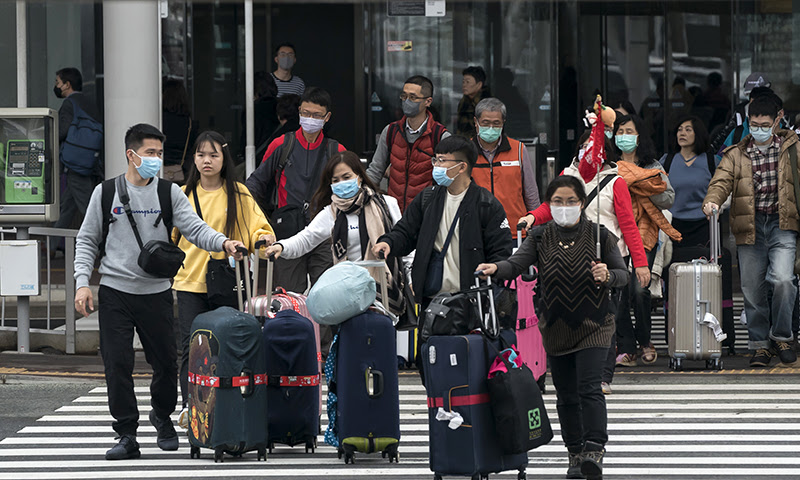
CORONAVIRUS: Global Health Emergency Declared
Following the advice of the Emergency Committee today (30 January 2020), the WHO Director-General has declared the outbreak of novel coronavirus (2019-nCoV) a Public Health Emergency of International Concern. In China, more than 7700 cases have been confirmed, and 170 people have died. Over 120 have recovered and been discharged from hospital. There are 82 […]

Following the advice of the Emergency Committee today (30 January 2020), the WHO Director-General has declared the outbreak of novel coronavirus (2019-nCoV) a Public Health Emergency of International Concern.

In China, more than 7700 cases have been confirmed, and 170 people have died. Over 120 have recovered and been discharged from hospital.
There are 82 additional cases confirmed in 18 countries. Of these, only 7 had no history of travel in China. There has been human-to-human transmission in 3 countries outside China. One of these cases is severe and there have been no deaths.
Over 6,000 passengers on a cruise liner were held in quarantine in Italy today, and were not allowed to disembark over a suspected case of coronavirus, after a passenger from China experienced flue-like symptoms (she and her partner were isolated)… however tests have fortunately proved false, and the passengers are now free to leave the ship.
The Committee said it wished to re-emphasize the importance of studying the possible source, to rule out ongoing hidden transmission.
What is a Coronavirus?
Coronaviruses (CoV) are a large family of viruses that cause illness ranging from the common cold to more severe diseases such as Middle East Respiratory Syndrome (MERS-CoV) and Severe Acute Respiratory Syndrome (SARS-CoV). A novel coronavirus (nCoV) is a new strain that has not been previously identified in humans.
Coronaviruses are zoonotic, meaning they are transmitted between animals and people.
What are the Coronavirus Symptoms?
Common signs of infection include respiratory symptoms, fever, cough, shortness of breath and breathing difficulties. In more severe cases, infection can cause pneumonia, severe acute respiratory syndrome, kidney failure and even death
Who’s Coronavirus Advice for the Public
WHO’s standard recommendations for the general public to reduce exposure to and transmission of a range of illnesses are as follows, which include hand and respiratory hygiene, and safe food practices:
- Frequently clean hands by using alcohol-based hand rub or soap and water;
- When coughing and sneezing cover mouth and nose with flexed elbow or tissue – throw tissue away immediately and wash hands;
- Avoid close contact with anyone who has fever and cough;
- If you have fever, cough and difficulty breathing seek medical care early and share previous travel history with your health care provider;
- When visiting live markets in areas currently experiencing cases of novel coronavirus, avoid direct unprotected contact with live animals and surfaces in contact with animals;
- The consumption of raw or undercooked animal products should be avoided. Raw meat, milk or animal organs should be handled with care, to avoid cross-contamination with uncooked foods, as per good food safety practices.
Coronavirus Myth Busters
Can pets at home spread the new coronavirus (2019-nCoV)?
At present, there is no evidence that companion animals/pets such as dogs or cats can be infected with the new coronavirus. However, it is always a good idea to wash your hands with soap and water after contact with pets. This protects you against various common bacteria such as E.coli and Salmonella that can pass between pets and humans.
Does the new coronavirus affect older people, or are younger people also susceptible?
People of all ages can be infected by the new coronavirus (2019-nCoV). Older people, and people with pre-existing medical conditions (such as asthma, diabetes, heart disease) appear to be more vulnerable to becoming severely ill with the virus.
WHO advises people of all ages to take steps to protect themselves from the virus, for example by following good hand hygiene and good respiratory hygiene.
Are antibiotics effective in preventing and treating the new coronavirus?
No, antibiotics do not work against viruses, only bacteria.
The new coronavirus (2019-nCoV) is a virus and, therefore, antibiotics should not be used as a means of prevention or treatment.
However, if you are hospitalized for the 2019-nCoV, you may receive antibiotics because bacterial co-infection is possible.
Are there any specific medicines to prevent or treat the new coronavirus?
To date, there is no specific medicine recommended to prevent or treat the new coronavirus (2019-nCoV).
However, those infected with the virus should receive appropriate care to relieve and treat symptoms, and those with severe illness should receive optimized supportive care. Some specific treatments are under investigation, and will be tested through clinical trials. WHO is helping to accelerate research and development efforts with a range or partners.
For any South African expats in China, please note:
https://www.facebook.com/SAPeople/posts/10156593143566949/
